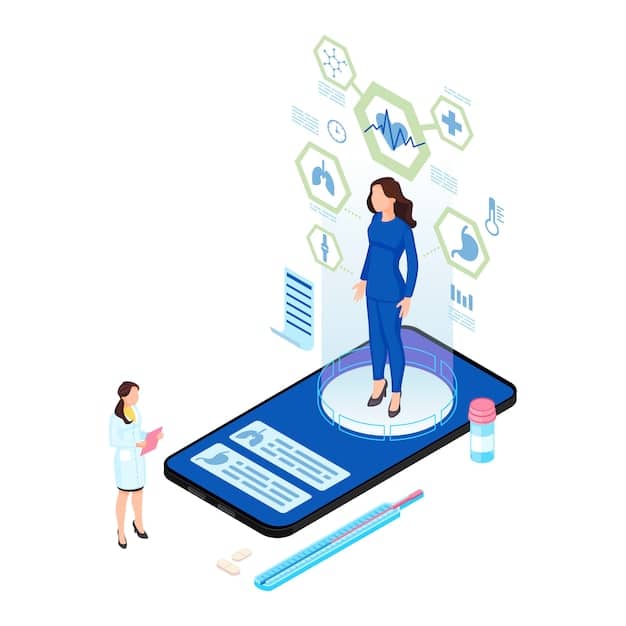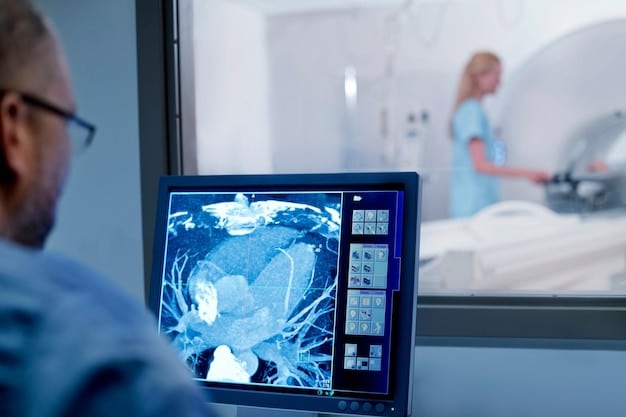AI in Healthcare: FDA Approvals and the Future of US Patient Care

AI-Powered Healthcare is revolutionizing US patient care with recent FDA approvals, enabling earlier diagnoses, personalized treatments, and streamlined healthcare operations, ultimately enhancing both patient outcomes and the efficiency of healthcare providers.
The landscape of healthcare in the United States is undergoing a significant transformation, largely driven by advancements in artificial intelligence (AI). Recent FDA approvals for AI-powered medical devices and software are paving the way for more efficient, personalized, and effective patient care. AI-Powered Healthcare: How New FDA Approvals Are Transforming US Patient Care by offering innovative solutions that promise to reshape the future of medicine.
The Rise of AI in US Healthcare: An Overview
Artificial intelligence is rapidly moving from science fiction to a practical tool in various industries, and healthcare is no exception. In the US, the integration of AI into healthcare is gaining momentum, with applications ranging from diagnostics to drug discovery. The FDA’s role in approving these AI-driven technologies is crucial for ensuring their safety and efficacy.
The adoption of AI in healthcare aims to address numerous challenges, including rising healthcare costs, workforce shortages, and the need for more efficient and accurate diagnostic tools. AI offers the potential to automate tasks, analyze large datasets, and provide insights that can improve patient outcomes. This section provides an overview of how AI is being implemented across different areas of healthcare in the US.
AI in Medical Imaging
AI algorithms are being used to analyze medical images such as X-rays, CT scans, and MRIs, helping radiologists detect anomalies more quickly and accurately. This can lead to earlier diagnoses and improved treatment outcomes.
AI in Drug Discovery
AI is accelerating the drug discovery process by analyzing vast amounts of data to identify potential drug candidates and predict their efficacy and safety. This reduces the time and cost associated with traditional drug development methods.
AI in Personalized Medicine
AI is enabling personalized medicine by analyzing a patient’s genetic information, medical history, and lifestyle factors to tailor treatment plans to their specific needs. This approach can lead to more effective treatments and fewer side effects.
AI is poised to revolutionize US healthcare.
- Efficiency: AI-driven tools automate administrative tasks, freeing up healthcare professionals to focus on patient care.
- Accuracy: AI algorithms can analyze medical data with greater precision, reducing the risk of human error.
- Accessibility: AI-powered telehealth solutions can extend healthcare access to underserved populations.
In conclusion, the integration of **AI-Powered Healthcare** presents numerous opportunities to enhance patient care in the US. The FDA’s approval process plays a vital role in ensuring that these technologies are safe and effective, paving the way for a future where AI is an integral part of healthcare delivery.
FDA’s Role in Approving AI Healthcare Technologies
The Food and Drug Administration (FDA) plays a pivotal role in regulating AI-powered medical devices and software in the US. The FDA’s approval process ensures that these technologies meet stringent safety and efficacy standards before they can be widely adopted in healthcare settings.
The FDA’s approach to regulating AI in healthcare is evolving as the technology advances. The agency is working to strike a balance between fostering innovation and protecting patients. This section explores the FDA’s regulatory framework for AI in healthcare, including the different types of approvals and the criteria used to evaluate AI-powered medical devices.

Types of FDA Approvals for AI in Healthcare
The FDA offers several pathways for approving AI-powered medical devices, including premarket approval (PMA), 510(k) clearance, and de novo classification. Each pathway has different requirements and is suited to different types of devices.
Evaluation Criteria for AI Medical Devices
The FDA evaluates AI-powered medical devices based on several criteria, including their accuracy, reliability, and safety. The agency also considers the potential risks and benefits of the device and whether it performs as intended.
Challenges in Regulating AI
Regulating AI in healthcare presents unique challenges, including the need to address issues such as bias in AI algorithms, data privacy, and cybersecurity. The FDA is working to develop new approaches to address these challenges and ensure that AI technologies are used responsibly.
The FDA’s clearance processes are essential for safe AI deployment.
- Premarket Approval (PMA): Rigorous evaluation for high-risk devices.
- 510(k) Clearance: Streamlined pathway for devices similar to those already on the market.
- De Novo Classification: Pathway for novel devices with moderate risk.
In conclusion, the FDA’s regulatory oversight is crucial for ensuring the safety and efficacy of **AI-Powered Healthcare** technologies in the US. By setting clear standards and evaluating AI medical devices thoroughly, the FDA is helping to foster innovation while protecting patients.
New FDA Approvals: Success Stories and Examples
Recent FDA approvals of AI-powered healthcare technologies are transforming patient care in various medical fields. These approvals mark significant milestones in the integration of AI into healthcare and highlight the potential of AI to improve patient outcomes.
This section showcases several success stories and examples of AI-powered medical devices and software that have received FDA approval. These examples demonstrate how AI is being used to address specific clinical needs and improve the efficiency and accuracy of healthcare delivery.

AI in Cardiovascular Disease Detection
AI algorithms are being used to analyze electrocardiograms (ECGs) and echocardiograms to detect cardiovascular diseases such as atrial fibrillation and heart failure. These AI-powered tools can help physicians make earlier and more accurate diagnoses, leading to better patient outcomes.
AI in Cancer Diagnosis and Treatment
AI is playing an increasingly important role in cancer diagnosis and treatment. AI algorithms are being used to analyze pathology images, identify biomarkers, and predict treatment response. These applications can help oncologists personalize treatment plans and improve survival rates.
AI in Diabetes Management
AI-powered systems are being used to monitor blood glucose levels, predict hypoglycemia and hyperglycemia events, and provide personalized recommendations for insulin dosing. These systems can help individuals with diabetes better manage their condition and reduce the risk of complications.
AI’s impact on patient outcomes is undeniable.
- Improved Diagnosis: AI algorithms can detect diseases earlier and more accurately.
- Personalized Treatment: AI enables the tailoring of treatment plans to individual patient needs.
- Enhanced Efficiency: AI automates tasks, reducing the workload on healthcare professionals.
In conclusion, the new FDA approvals of **AI-Powered Healthcare** technologies are demonstrating the transformative potential of AI in patient care. These success stories highlight how AI can be used to address specific clinical needs and improve the efficiency and accuracy of healthcare delivery.
Challenges and Ethical Considerations
While the integration of AI into healthcare offers numerous benefits, it is essential to acknowledge and address the challenges and ethical considerations associated with this technology. These challenges include issues such as bias in AI algorithms, data privacy, and cybersecurity.
This section explores the key challenges and ethical considerations that must be addressed to ensure that **AI-Powered Healthcare** is used responsibly and ethically. It discusses the potential risks of AI in healthcare and proposes strategies for mitigating these risks.
Bias in AI Algorithms
AI algorithms can perpetuate and amplify existing biases in healthcare data, leading to disparities in treatment outcomes. It is crucial to ensure that AI algorithms are trained on diverse and representative datasets and that they are regularly evaluated for bias.
Data Privacy and Security
The use of AI in healthcare requires access to large amounts of patient data, raising concerns about data privacy and security. It is essential to implement robust data protection measures and ensure that patients have control over their health information.
Lack of Transparency
The “black box” nature of some AI algorithms makes it difficult to understand how they arrive at their conclusions. This lack of transparency can undermine trust in AI and make it difficult to identify and correct errors.
Addressing the ethical issues is a prerequisite for AI’s full potential.
- Transparency: Clear understanding of how AI algorithms arrive at conclusions.
- Fairness: Ensuring AI not perpetuate bias or disparities in healthcare.
- Accountability: Clear lines of responsibility for AI’s outcomes in healthcare.
In conclusion, the responsible and ethical use of **AI-Powered Healthcare** requires careful consideration of the associated challenges and risks. By addressing issues such as bias, data privacy, and transparency, we can ensure that AI is used to improve patient care and promote health equity.
The Future of AI in Healthcare: Predictions and Trends
The future of AI in healthcare is poised for continued growth and innovation. As AI technology advances and becomes more integrated into healthcare systems, we can expect to see even more transformative applications that improve patient outcomes and enhance the efficiency of healthcare delivery.
This section explores the key trends and predictions for the future of **AI-Powered Healthcare**. It discusses the potential impact of AI on various aspects of healthcare, from diagnostics and treatment to prevention and wellness.
AI in Telehealth and Remote Monitoring
AI is expected to play a significant role in expanding access to healthcare through telehealth and remote monitoring technologies. AI-powered virtual assistants and remote monitoring devices can provide personalized care and support to patients in their homes, reducing the need for in-person visits.
AI in Predictive Healthcare
AI algorithms can analyze large datasets to predict which patients are at risk of developing certain conditions, allowing healthcare providers to intervene early and prevent serious health problems. This approach can lead to more proactive and personalized care.
AI in Robotics and Automation
AI is being used to develop robots that can assist with surgeries, dispense medications, and perform other tasks that are currently done by humans. These robots can improve efficiency, reduce errors, and free up healthcare professionals to focus on more complex tasks.
The future holds exciting possibilities for AI in medicine.
- Increased Automation: Streamlining routine tasks to reduce workload for healthcare staff.
- Enhanced Predictions: Improving the ability to predict and prevent diseases before onset.
- Broader Accessibility: Extending high quality healthcare to remote and underserved communities.
In conclusion, the future of **AI-Powered Healthcare** is bright, with numerous opportunities to improve patient care, enhance efficiency, and expand access to healthcare. By embracing these trends and innovations, we can create a healthcare system that is more personalized, proactive, and effective.
Preparing for AI in Healthcare: What Stakeholders Need to Know
The successful integration of AI into healthcare requires a collaborative effort from various stakeholders, including healthcare providers, patients, policymakers, and technology developers. Each stakeholder must understand the potential benefits and challenges of AI and be prepared to adapt to the changing landscape of healthcare.
This section provides guidance for each stakeholder on how to prepare for the integration of **AI-Powered Healthcare**. It discusses the knowledge, skills, and resources needed to effectively utilize AI and ensure that it is used responsibly and ethically.
For Healthcare Providers
Healthcare providers need to develop a basic understanding of AI technology and its applications in healthcare. They also need to be trained on how to use AI-powered tools and interpret their results. Continuous professional development and training programs are essential.
For Patients
Patients need to be informed about the use of AI in their care and have the opportunity to provide input on how AI is used. Transparency and patient engagement are crucial for building trust in AI.
For Policymakers
Policymakers need to develop regulations and policies that promote the responsible and ethical use of AI in healthcare. These policies should address issues such as data privacy, bias, and transparency.
Preparing the ground for AI in healthcare requires multi-faceted efforts.
- Training: Equip healthcare providers with the knowledge to adopt AI tools.
- Education: Inform patients on how AI is used and protects their interests.
- Regulation: Creating laws that ensure AI use is safe, fair, and transparent.
In conclusion, preparing for **AI-Powered Healthcare** requires a collaborative and proactive approach from all stakeholders. By investing in education, training, and policy development, we can ensure that AI is used to improve patient care and create a more efficient and equitable healthcare system.
| Key Point | Brief Description |
|---|---|
| 🤖 AI in Diagnostics | AI enhances medical imaging analysis for faster, more accurate diagnoses. |
| 💊 AI in Drug Discovery | AI accelerates drug discovery by analyzing vast datasets and predicting efficacy. |
| 🩺 FDA Approvals | FDA approvals ensure the safety and effectiveness of AI-powered healthcare technologies. |
| 🛡️ Ethical Concerns | Addressing bias, data privacy, and transparency is crucial for ethical AI use. |
Frequently Asked Questions (FAQ)
AI-Powered Healthcare refers to the use of artificial intelligence technologies to improve various aspects of healthcare, including diagnostics, treatment, and patient care. It leverages algorithms and machine learning to analyze medical data and provide insights that can enhance the efficiency and accuracy of healthcare services.
The FDA regulates AI-powered medical devices and software through various approval pathways, including premarket approval (PMA), 510(k) clearance, and de novo classification. These pathways ensure that AI technologies meet stringent safety and efficacy standards before they can be used in healthcare settings.
AI in medical imaging enhances the accuracy and speed of image analysis, helping radiologists detect anomalies more effectively. This leads to earlier and more accurate diagnoses of conditions such as cancer, cardiovascular diseases, and neurological disorders, ultimately improving patient outcomes.
Ethical considerations include bias in AI algorithms that can lead to healthcare disparities, data privacy concerns due to the need for large amounts of patient data, and the lack of transparency in how some AI algorithms make decisions, which can undermine trust in the technology.
Healthcare providers can prepare by developing a basic understanding of AI technology, participating in training programs, and staying informed about the latest AI applications in healthcare. They should also foster a culture of transparency and patient engagement to build trust in AI-driven healthcare solutions.
Conclusion
In summary, **AI-Powered Healthcare** is significantly reshaping US patient care through new FDA approvals and technological advancements. Despite the challenges and ethical considerations, the potential benefits of AI in improving diagnostics, treatments, and overall healthcare efficiency are immense, promising a future where healthcare is more personalized, proactive, and effective for all.